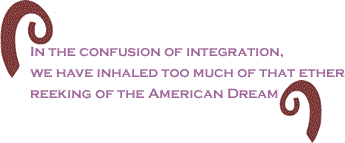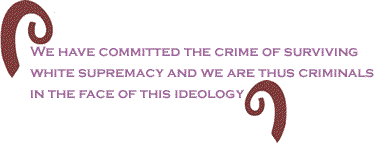
|
|||||||||||||||||||||
 |
|||||||||||||||||||||
|
||||||||||
 |
||||||||||
|
||||||||||
The current issue is always free to everyone If
you need the access available to a |
||||||||||
 |
||||||||||
I thank the spirits for our Ancestors who, after toiling fourteen and fifteen hours under sun and whip, crept with determination to tree stubs or cabins in the wee hours to sit and learn the alphabet in order to read. They managed child care among themselves. Mothers or not, women and girls worried about all the children who would be sold or defiled by the Master. Many, too, managed to sum up all their experiences into a mournful cadence and others still added words and rhythm. All of these are gifts given to each other and handed down to us. The first Black people to successfully conduct a revolution against the French, British, and Spanish nations lived those days and nights too. “…The knowledge of one’s own foundation story may be the
most consoling, indeed, the most empowering form of wealth
there is — a wealth more sustaining over time than all the
worldly goods one could conceive of,” writes Randell Robinson
(An
Unbroken Agony: Haiti, From Revolution to the Kidnapping of
a President Robinson recalls observing the Haitian people on the street and in rural towns. The way he had been “trained” to see turned the people into objects: He saw clothes and material possessions. “But what can a cloth suit tell me about the wealth of a soul?” Altering his perspective, Robinson saw the Ancestors in the people before him and when he did, he was able to recognize why the West, particularly the U.S., held such animosity toward the Haitian people. He writes: “The Haitians knew their history. The Haitian peasant may have had few material possessions to speak of, but they knew what their slave ancestors had done to the French, to the English, and to the Spanish. They also knew what they had done to liberate all of Latin America, as well as themselves. No matter how poor they were, the Haitian knew these things about themselves, things that made them special to themselves, that made them resilient and independent, that gave them great art, that unsettled, even now, those nations the peasants’ slave ancestors had once soundly thrashed.” Once these Ancestors united to overthrow their European enslavers, a wave of resistance against enslavement was possible.
In the U.S., we share in that heritage of resistance, of revolution in the Americas. But in the confusion of integration, we have inhaled too much of that ether reeking of the American Dream from which even King had to run. Some of us have lost our minds — our memory. We can’t seem to remember that those many, many people who marched and boycotted, who sat at lunch counters, who walked rather than ride buses and walked off low-waged jobs had nothing but the desire for real change. They were at the bottom of the barrel and bosses, business owners, city authorities and the police were an oppressive mob 24-7. For those able to see and recall with pride our great wealth, our shinning prince, our Malcolm, we have to ask, what would Malcolm tell us now as we are locked out of education and employment, pinned down in prisons throughout this country, suffering from heart attacks and diabetes with no adequate health care? What course of action can we learn from him as we face people powerful in terms of weaponry rather than numbers, who have always demanded the land and resources of others, and now subject us to “ethnic cleansing,” as William Guerrero reports, in major urban cities throughout this county? (“From New Orleans to Harlem and San Francisco’s Mission District, Gentrification: Bankers and Landlords push ‘Ethnic Cleansing’). Let’s not forget: the waters are rising as the sky is truly falling all around this planet, while King George and Darth Vader plan their quick get-away to an uninhabited island somewhere. Violence against Black citizens in the U.S., writes Roland Sheppard, did not end with the old form of slavery. “Terrorism,” he writes, continued with police and Ku Klux Klan activities centered on overthrowing Black Reconstruction and institutionalizing legal segregation (Jim Crow) in the former slave states” (“Historic Role of Police Brutality in the Black Community and in the African American Oppression”). Malcolm knew that white Americans, so dependent on the use of brute force, couldn’t be expected to adopt the idea of democracy or peace overnight. Laws established by force of Black community pressure and international outrage could be violated and even rescinded by white cunning. On February 16, 1965, days before he was killed, Malcolm told us:
They accuse us of what they themselves are guilty of. This is what the criminal always does. They’ll bomb you, then accuse you of bombing yourself. They’ll crush your skull, then accuse you of attacking him. This is what the racists have always done — the criminal, the one who has criminal processes developed into a science. Their practice is criminal action. And they then use the press to make you victim — look like the victim is the criminal, and the criminal is the victim…
They make it appear that the role of crime in the Black community is higher than anywhere else… This keeps the Black community in the image of a criminal. (“Not Just An American Problem”) Black faces in mug shots, “images of a criminal,” conceal the fact that this country is the biggest drug dealer and gun supplier in the world and that it is engaging the practice of slavery (at plantation-like prison sites) for the benefit of corporate interests. A third of those who fought the California fires in October, Rev. Jesse Jackson announced, were prisoners who, on release from prison, will not be able to secure work as firefighters! Malcolm understood how language is used to control a people’s ability to defend its community. Behind these concocted images of crime in the U.S., babies in Iraq are massacred by the same “good” people urged to feel “safe” from Black youths who are incarcerated in ever-higher numbers. The “good,” dressed up in black, carrying massive weaponry, fly off to black sites to fight “terrorism.” These mercenary types, Malcolm told us many, many years ago when he spoke about this government’s aggressive action in Vietnam, are “hired” killers... who kill, who draw “blood for money, anybody’s blood.” They “kill a human being as easily as [they] kill a cat or a dog or a chicken…” (“Not Just An American Problem”). Black children, in gangs or not, are incarcerated while these serial killers get rich on killing! Oh, gather up those photos of Britney and Lohan. Elvis has arisen, again! The continuous engagement in mass violence by this government, said Malcolm, is labeled “humanitarian, an act of humanitarianism” (“Not Just An American Problem”). “In the name of freedom” is the slogan used to continue engaging in violence. “All kinds of high-sounding slogans” are used, Malcolm explained, “but it’s cold-blooded murder, mass murder.” Profiteers of violence! Malcolm was the “most honest” man I ever encountered, said Roland Sheppard, who knew and worked with Malcolm. At the time of his death, Shepard said, Malcolm was “calling for the organization” of Black people in response to the campaign of violence (escalating prison time for Black youths, for example) waged against Blacks within the U.S. and without, for ultimately the call to Black Americans urged awareness and participation in a world-wide campaign against Euro-American capitalist interests. What did Malcolm say when, forty years ago, he witnessed the writing on the wall? Organize for self-defense! Whites can help, but they can’t join us. There can be no black-white unity until there is first some black unity. There can be no workers' solidarity until there is first some racial solidarity. We cannot think of uniting with others, until after we have united among ourselves. We cannot think of being acceptable to others until we have first proven acceptable to ourselves.
An agenda of solidarity among Black people has always been perceived as a threat! Black people, as a whole, are a threat because we still exist! If Democrats, Senator Feinstein, for example, (see Gang Abatement and Prevention Act 2007, S. 456), have their way, five young Black people standing together will be a crime! We have committed the crime of surviving white supremacy and we are thus criminals in the face of this ideology. Would an agenda of Empire, naming crime where there isn’t any and naming criminals were there aren’t any, be more suitable? When do we begin to fight against this terrorism? Dr. Abdul Alkalimat believes “All politics is local.” He is the Director of Africana Studies and Professor of African Studies and Sociology at the University of Toledo. Our organization could “lay the bases for community efforts and certain kinds of politics.” We should look to where there are already “efforts to change taking place in the Black community,” Alkalimat said. Then we need to consider “what are the interests of this community.” I would think that this organization should center on the interests affecting the majority of the Black population. Community newspapers and newsletters were an
important component to organizing the people in Malcolm’s
day. “The people who worked with Malcolm,” said Sheppard,
“defended him” in The Militant as well as helped publish
Malcolm
X Speaks For Malcolm, Sheppard reminds us, the Black struggle was an “economic and social struggle for human rights” (“The Assassinations of Martin Luther King, Jr. and Malcolm X”). As Malcolm said, “As long as you call it civil rights, it’s a domestic problem within the jurisdiction of the United States government.” (“Not Just An American Problem”). We begin where we are and remember how we, men, women, and children, came together in the clearing and formed a circle in which all of us where included and in which nothing was done individually or in excess. Every individual was important to the well-being of the communal; “privatization” of the scarce resources available to them was frowned upon. Life was valued despite living among people intimidated by peace. Acts of compassion meant more than the hatred that surrounded them.
Our Ancestors did not stop at singing the Blues. These people of the Clearing, our Ancestors, accomplished the impossible together — as a collective. They accomplished the impossible together, focused on the collective interests of gaining their human rights. We are those people and they are us, Malcolm would tell us. We know enough. Let’s move! To listen to Malcolm X speak, see brothermalcolm.net. Also, read Roland Sheppard’s essays on his Website. BlackCommentator.com Editorial Board member Lenore Jean Daniels, PhD, has been a writer, for over thirty years of commentary, resistance criticism and cultural theory, and short stories with a Marxist sensibility to the impact of cultural narrative violence and its antithesis, resistance narratives. With entrenched dedication to justice and equality, she has served as a coordinator of student and community resistance projects that encourage the Black Feminist idea of an equalitarian community and facilitator of student-teacher communities behind the walls of academia for the last twenty years. Dr. Daniels holds a PhD in Modern American Literatures, with a specialty in Cultural Theory (race, gender, class narratives) from Loyola University, Chicago. Click here to contact Dr. Daniels. |
||||||||||
| November
8 , 2007 Issue 252 |
|
| Printer Friendly Version in resizeable plain text format format |
 |
 |
 |
| |
| |

































